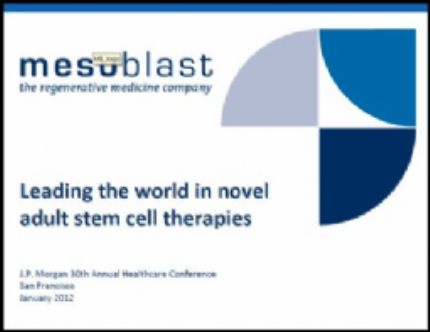
Mesoblast Limited (ASX:MSB) National Media Coverage Reported On Positive Preclinical Results For Treatment Of Diabetes
Melbourne, Dec 21, 2009 AEST (ABN Newswire) - Australian regenerative medicine company, Mesoblast Limited (ASX:MSB)(PINK:MBLTY), today confirmed that national news items broadcast last Friday on the ABC, Channel 9, Channel 7 and Channel 10 reported on positive preclinical results using its patented adult stem cell technology platform for the treatment of diabetes.
Dr. Ravi Krishnan, Senior Scientist at the Queen Elizabeth Hospital in Adelaide, South Australia, led the study in collaboration with Mesoblast's United States-based associate company Angioblast Systems Inc.
The national coverage included interviews with Dr Krishnan and Mesoblast Executive Director Professor Silviu Itescu.
In the interests of full and fair disclosure, transcripts of the television and radio news items follow:
Transcript: Channel 10, Friday 18 December 2009
Presenter: To a breakthrough that is promising to change the lives of Australians living with Type 2 diabetes. Adelaide researchers have used stem cells to develop a one-off treatment, making insulin injections a remedy of the past.
Reporter: Jarrod Ward knows the pain of insulin injections.
Jarrod Ward: It can be anywhere between five to 10 times a day. Just having to carry it everywhere with me, it's just a big hassle.
Reporter: But for Type 2 diabetics, that could all be about to change. Researchers at the Queen Elizabeth Hospital have developed a new treatment made up of stem cells isolated from healthy volunteers.
Silviu Itescu: The results today demonstrate that potentially a single injection of these unique adult stem cells can result in long-term improvement through repair and regeneration of the pancreas.
Reporter: Researchers have tested the treatment on mice in their Adelaide laboratory. Just one dose has dramatically reduced blood sugar and naturally increased insulin levels.
In humans, development company Mesoblast hopes the effect could last for around six months.
Dr Ravi Krishnan: Essentially, we are using these characteristics of these cells to re-establish the normal function of the pancreas.
Reporter: That eliminates the need for drugs, including insulin injections in chronic sufferers.
The company has already had success in using stem cells to treat patients suffering from osteoarthritis and cardiovascular disease in the United States. It hopes to be treating diabetics here in Australia within three years.
If human trials are successful, the treatment will next be tested for Type 1.
Transcript: ABC 1, Friday 18 December 2009
Presenter: Australian researchers have announced a potentially significant advance in the treatment of Type 2 diabetes.
Scientists at Adelaide's Queen Elizabeth Hospital wanted to see whether injecting mice with adult stem cells taken from bone marrow would help repair a damaged pancreas.
Over a three-week period, they noticed a two-fold increase in cells that produced insulin and a decrease in glucose levels.
The scientists say this indicates the stem cells can help the pancreas to control blood sugar.
Dr Ravi Krishnan: They've got a unique ability to regenerate and repair, so essentially, we are utilising these characteristics of these cells to re-establish the normal function of the pancreas.
Presenter: Human trials are expected to start within a year.
Transcript: Channel 9 News and Nightline - Friday, 18 December 2009
Presenter: Any development on diabetes has the potential to improve the lives of millions of people, and Adelaide's scientists seem to have done it.
They've proved that stem cells can help the pancreas recover and adjust the body's sugar levels. Human trials will begin in 12 months.
Reporter: Eliza Bartlett seems like any 17-year-old, but the Type 1 insulin dependent diabetic lives with a pump that administers insulin when her blood sugar levels fall.
Eliza Bartlett: I have to constantly prick my finger and make sure I know what I'm eating, which is a huge thing just knowing the carbohydrates in food. It's a lot of extra work I guess.
Reporter: Eliza is one of 250 million people who need to check their sugar levels and adjust their insulin daily, either by pump, tablets or injections.
But Melbourne company Mesoblast and the Queen Elizabeth Hospital have taken stem cells from the human body, adapted and multiplied them and injected them into mice.
Over three weeks, their insulin rose and glucose levels dropped.
Silviu Itescu: Potentially a single injection of these unique adult stem cells can result in long-term improvement through repair and regeneration of the pancreas.
Dr Ravi Krishnan: I think there will be a significant impact on humankind with this treatment, but I think we need to do a few more trials, clinical trials, before we can be confident of that.
Reporter: While experts won't go as far as to brand this a cure for diabetes, they are confident this stem cell treatment will eliminate the need for insulin and other therapies altogether. Human trials start in 12 months, with treatment potentially available in three years.
Transcript: Channel 7 News - Friday, 18 December 2009
Presenter: Local researchers are working on groundbreaking treatment for diabetes, which could change the lives of almost two million Australians. It uses adult stem cells and could spell the end of daily insulin injections.
Reporter: For Humphrey McGrath, diagnosis came just in time.
Humphrey McGrath: If I did nothing, I would have a major heart attack or stroke within the next five years.
Reporter: But the impact of diabetes could soon be reduced. Researchers at the Queen Elizabeth Hospital are trialling a new way to treat the disease. They've been injecting mice with Type 2 diabetes with adult stem cells, and found their blood-insulin levels have increased.
Dr Ravi Krishnan: We are utilising these characteristics of these cells to re-establish the normal function of the pancreas.
Reporter: By repairing the damaged pancreas, future complications such as heart disease and kidney failure can be prevented.
Dr Ravi Krishnan: Currently diabetes is treated with drugs and looking at cell therapy is essentially a very normal way of treating this very complex disease.
Reporter: And if these trials are successful, they have the potential to end daily insulin injections for diabetics all together. This would mean the world to Humphrey.
Humphrey McGrath: I won't have the progression of the disease and I'll live to see my grandson turn 21.
Reporter: Trials on patients will begin next year.
Transcript: ABC Radio, Friday 18 December 2009
Newsreader: Scientists have reported promising results from using adult stem cells to lower blood glucose levels.
The study is based at Adelaide's Queen Elizabeth hospital and aims to help people with Type 2 diabetes.
Senior scientist Ravi Krishnan says stem cells were injected into mice with high blood sugar levels with the results monitored over three weeks.
Dr Ravi Krishnan: So our cell therapy essentially has helped to restore the balance between the beta and alpha cells, therefore allowing restoration of normal glucose levels and improved function.
Newsreader: It is hoped human trials will start within a year.
End of Segments
Contact
Julie Meldrum
Corporate Communications Director
Mesoblast Limited
Tel: +61-3-9639-6036
Mob: +61-419-228-128
Email: julie.meldrum@mesoblast.com
www.mesoblast.com
| ||
|







